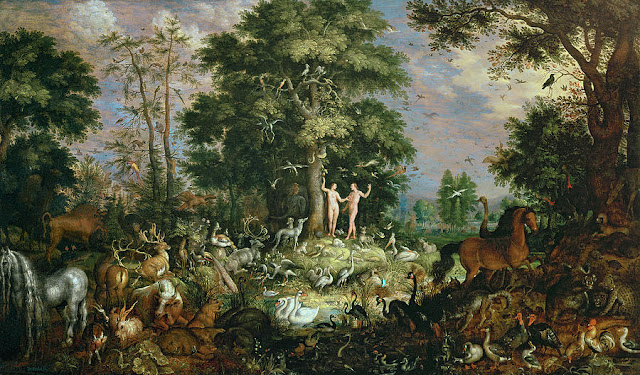This post will explore Philip K. Dick's recurring theme of the confusion of identity and its relation to Dick's life as well as its relation to larger social and economic forces.
Several of Philip K. Dick's novels are romans a clef, including Valis and A Scanner Darkly. In these books, different aspects of Dick's identity appear as either different characters or different personas within the same character. The main character is named Phil in Valis. And, also in Valis, Horselover Fat, the narrator, is another version of Philip K. Dick. Phil is the logical and sometimes theological Dick, while Horselover Fat is the failed lover and drug-addicted version of the writer.
A Scanner Darkly's autobiographical nature is more subtle--no character is named Phil in the book--but Scanner contains characters similarly arrayed as in Valis. At the end of Scanner Darkly, Dick lists himself as one of the people he knew that were negatively affected by methamphetamines, more than a hint that the book documents Dick's long romance with the junkie life.
Dick's consistent use of the split character reflecting himself is instructive in understanding the confusion of his identity. It demonstrates Dick's belief that the human psyche is at odds with itself, subject to various competing forces. This conflation of the self reflects a mid-20th century psychological understanding of the self, one part Freudian, considering the id, ego, and superego all within tension to the other, and one part Jungian psychological mode, of the animus and anima ever in tension with one another.
A Scanner Darkly was written out of the years Dick spent using while also opening his home to junkies. In Scanner, Dick's personalities are split in two. Fred is a police detective tasked with finding the source for substance-D. Bob Arctor is Fred's undercover alias, but the drug ruptures communication between the hemispheres of his brain, effectively splitting the two personalities.
Fred represents Philip K. Dick the professional, the popular, award-winning science fiction author. In 1963, Dick was awarded the Hugo for The Man in the High Castle and he received multiple nominations for other books throughout the '60s. Though during his life, only Do Androids Dream of Electric Sheep was picked up for the screen, in the last twenty years, several movies have been made from his works.
Bob Arctor also represents Dick, but he represents Dick the junkie, the shadow self in Jungian terms. The name Arctor is a play on actor. In the book, Fred has to pose as a junkie. He's only acting. But acting leads to his becoming an actual junkie and suffering real consequences from his posed lifestyle. Perhaps Dick's labeling the junkie persona as an actor reflects his own desire to cognitively distance himself from his drug abuse and the triggers driving him to use.
Dick not only conflates aspects of himself in his characters, but his concept of the ideal woman also recurs in his novels. Multiple women throughout his books are facets of an ideal: the dark-haired girl. The pretty, intelligent, and usually coy dark-haired girl is frequently the love interest in his books. The dark-haired girl spurns love as often as she accepts it in Dick's fiction, intimating that the dark-haired girl is pulled by the same opposing forces in her own psyche.
Dick plays with human identity by introducing androids that mistake themselves as humans. The central conceit of Do Androids Dream of Electric Sheep is that androids are made more human by giving them human memories. An android faced with the realization that their memories are false is faced with the dilemma of knowing their identity is inauthentic. But the purpose of implanting androids with false memories is to create a readymade and servile army of robotic workers. After all, the term robot is Czech, meaning forced labor.
The confusion of the android's identity reflects the longing of the proletariat to break out of his social standing despite his economic position. The creation of the android in science fiction was as a conceit to discuss the status of wage workers. It so happens that the concept of robotics is growing into a literal industry in the 21st century, but even those literal robots are designed as machines for carrying out forced labor.
So, what of implanted dreams in Dick's androids? Those implanted dreams reflect the reality of the wage worker. Despite the worker's low condition, they are always aware of how the most fortunate families live. The average person is constantly exposed to extravagant living through television shows, advertisements, movies, and by the proximity to wealth, whether towering skyscrapers, multi-million dollar bridges and roadways, museums and mansions, the telecommunications infrastructure, or whatever, really. Still, the reality of wealth is no less evident than the reality of poverty. The android, living in squalor, falsely remembers the rich green lawns it ran across in a childhood that was not its own. These dreams reflect the Judeo-Christian dream of returning to Eden, of somehow returning to the prelapsarian existence, disregarding whether that existence was ever real.
Dick's confusion of identity in the android, its belief that it is human based on false experience, also reflects the construction of identity in the age of digital communication and personal branding as a means of making a living. The close proximity of the camera to movies stars, professional athletes, and celebrities tricks the average viewer into believing that they belong in the space of the camera. A man accustomed to the perfect view of the football field or the basketball court on free sport's broadcasts meets a rude awakening when they try to attend a game. The same proximity to the field can cost the price of a new car at high profile games. Similarly, social media can create a false sense of community, a false sense of knowing celebrities or being close to them. Fans follow their heroes on social media accounts and have the illusion of knowing them, of hearing what they say and participating in a conversation with them. But those conversations are rarely authentic. The celebrity engages with his fans to market his products, even, as is now so often the case, if his product is just himself.
Buy A Scanner Darkly and Do Androids Dream of Electric Sheep at Amazon




